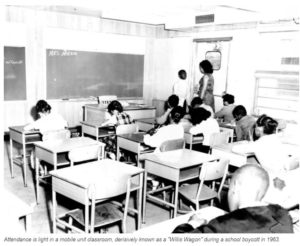Chicago Sun-Times
Robin Washington
10/20/2017
On Aug. 28, 1963, a quarter of a million people gathered at the March on Washington to call for civil rights.
Two months later, an equal number protested in Chicago against segregated schools.
If the former is now enshrined as a watershed moment for America, the latter has been nearly lost to history. A bit of it will be recalled this weekend with the premiere of “’63 Boycott”, a film more than 50 years in the making about one the largest civil rights actions in the North and the events leading up to it.
Some of us never forgot them. I was six years old at the time and in the first grade, by then already a veteran of numerous marches and protests. I was brought to them by my mother, Jean Birkenstein Washington, a teacher and Congress of Racial Equality and NAACP activist. For my 10-year-old brother and me, they were family outings, alternated by trips to the zoo or the Museum of Science and Industry.
I can’t remember never knowing what they were all about. Our home in Old Town doubled as the headquarters of Teachers For Integrated Schools, with our living room cluttered with mimeographed leaflets and maps showing school districts gerrymandered along neighborhood racial lines. (One example then was Sexton — a district a mile long and a block wide, coinciding with a Puerto Rican strip of the Near North Side.)
I played during strategy sessions about how to get rid of Benjamin C. Willis, Mayor Richard J. Daley’s handpicked school superintendent, who black Chicagoans viewed every bit a segregationist as Birmingham, Alabama’s Bull Conner. A particular goal was getting rid of his “Willis Wagons” — mobile trailer classrooms that kept black schools overcrowded while empty rooms took up space in nearby white schools.
Most etched in my mind is the week-long sit-in at the Board of Education headquarters, then at LaSalle Street and Wacker.
“Are you scared?” I recall reporters asking me — and wondering why I would be. My brother was a few feet away, playing chess with a neighbor; my foster sister concocting ways to sneak hamburgers in to feed us (“We forgot about food,” CORE student leader Charles Smith says in the documentary), my mother in another room negotiating.
I don’t remember being physically ejected by the police after a week, but in huge page-one stories, newspaper clippings say we were. A newspaper photo, in Chicago’s American, showed me picketing in front afterward, holding a sign bigger than myself. The liberal Daily News editorialized the sit-in as “a galling nuisance” and the Sun-Times called us “roughnecks” — reminders, for those requiring proof or a parallel, to present-day attitudes about football players taking a knee.
The sit-in was not successful. But a month later, the March on Washington rekindled enthusiasm, as did outrage after Willis offered his resignation in early October but the board refused to accept it. The rights groups called for a citywide boycott. And like the Washington march, it was nonviolent and came off without a hitch.
Some 224,770 elementary and high school students were absent from class that day, and an untold number of adults marched to the board building. I clearly remember the salmon-colored boycott leaflet but don’t specifically recall the march, either because I stayed home for that one or conflated it with so many others.
“The feeling was excitement, hope that we’d accomplished something,” boycott organizer and Englewood parent Rosie Simpson recalls in the film.
Those hopes, once again, were not immediately realized. Another boycott came the next February, followed by Martin Luther King’s two-year sojourn in Chicago. Willis would stay on for another three years, as activists grew more disillusioned.
Decades later, magnet schools show some integration and academic achievement. Yet de facto segregation still marks Chicago schools.
Yet so too does protest, reignited in 2013 by students and parents outraged over Mayor Rahm Emanuel’s massive school closings.
With footage shot a half-century earlier as a college student, director Gordon Quinn — creator of the seminal film “Hoop Dreams” — planned the boycott documentary for its 50th year. He missed the anniversary date. But with co-producers Rachel Dickson and Tracye A. Matthews, he reimagined it as a 30-minute short doc, and produced one packed full of facts.
Telling the story in the documentary are boycott planners Simpson, Timuel Black and Don Rose, among others (I am not one), drawing straight lines from the movement to today.
Events I recall vividly, and resonating far too closely.
Robin Washington is a member of The Boston Globe editorial board and was executive producer of the PBS Civil Rights Movement documentary “You Don’t Have to Ride Jim Crow!” He may be reached at robin@robinwashington.com or via twitter @robinbirk



 WordPress
WordPress